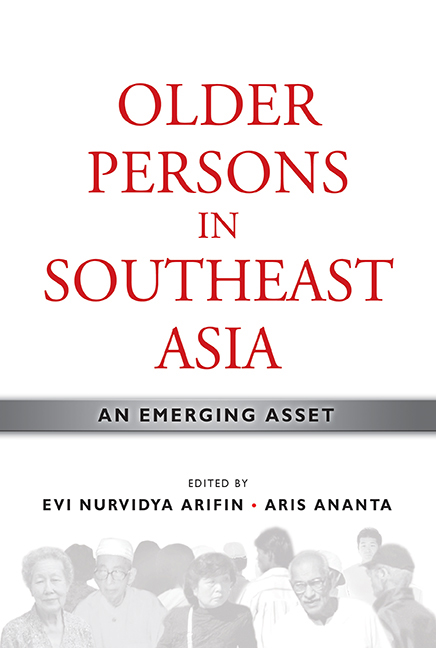Book contents
- Frontmatter
- Contents
- List of Tables
- List of Figures
- Foreword by Hal Hill
- Message from the Director
- Preface
- Contributors
- PART I INTRODUCTION
- PART II OLD-AGE INCOME SECURITY
- PART III EMPLOYMENT AND OTHER SOURCES OF FINANCIAL CONTRIBUTION
- 7 Employment of Older Persons: Diversity across Nations and Subnations in Southeast Asia
- 8 Work, Income, and Expenditure: Elderly and Near-elderly Women in Metro Cebu, Philippines
- 9 Employability Approach to Financing Old Age
- 10 Facing the Geriatric Wave in Indonesia: Financial Conditions and Social Support
- PART IV AGEING, MIGRATION, AND DEVELOPMENT
- PART V ROLES OF GOVERNMENT AND CIVIL SOCIETY
- Index
10 - Facing the Geriatric Wave in Indonesia: Financial Conditions and Social Support
from PART III - EMPLOYMENT AND OTHER SOURCES OF FINANCIAL CONTRIBUTION
Published online by Cambridge University Press: 21 October 2015
- Frontmatter
- Contents
- List of Tables
- List of Figures
- Foreword by Hal Hill
- Message from the Director
- Preface
- Contributors
- PART I INTRODUCTION
- PART II OLD-AGE INCOME SECURITY
- PART III EMPLOYMENT AND OTHER SOURCES OF FINANCIAL CONTRIBUTION
- 7 Employment of Older Persons: Diversity across Nations and Subnations in Southeast Asia
- 8 Work, Income, and Expenditure: Elderly and Near-elderly Women in Metro Cebu, Philippines
- 9 Employability Approach to Financing Old Age
- 10 Facing the Geriatric Wave in Indonesia: Financial Conditions and Social Support
- PART IV AGEING, MIGRATION, AND DEVELOPMENT
- PART V ROLES OF GOVERNMENT AND CIVIL SOCIETY
- Index
Summary
A Geriatric Wave
Population ageing has been considered one of humanity' greatest triumphs and challenges, resulting from a success of various aspects of development such as public health, family planning, social transformation, as well as economic and political developments. Rapidly increasing longevity is certainly a great reward from development. On the other hand, longerliving older persons are more likely to be heavy users of health care and social services. Older persons are more likely to suffer from disability and long-term illnesses. Therefore, an improvement of the ageing policies has been a high priority in developed countries. In Australia, for instance, the number of older persons is rapidly increasing. In particular, the government of South Australia in 2006 initiated improvements to concession arrangements that benefited older persons. “Healthy Ageing for All” is one of the government' commitments.
As shown from a number of studies in developed countries (Lan 2001; Ory 2004; Lit 2006), an increasing number of older persons has increased demand for geriatric care needs and services, including medication and medical technology on the one hand, and geriatric care managers such as social workers, counsellors, nurses, gerontologists, or psychologists, and caregivers in the family on the other. In other words, an ageing population has generated a strong wave of geriatric patients, which produces great financial challenges for the family, community, and society to finance older persons.
Many countries in the world will experience increasingly ageing populations in the twenty-first century. They will face the geriatric wave, an entry of increasingly large cohorts of geriatric patients. Indonesia is not an exception. The number of Indonesian older persons will grow rapidly; while the number of those in the population under five years old will decline. In the late 1960s, Indonesia was still characterized by the norm of having “big families”, with a high fertility rate of 5.61 per woman, and high infant mortality at 145 per 1,000 live births. Indonesia officially started its family planning programme in 1968.
This government integrated programme provided the widest possible coverage of basic health services through the adoption of the concept of the community health centre, Puskesmas. It supplies medical treatment, maternal and child health, family planning, communicable disease control, hygiene and sanitation, nutrition, health education, dental health, school health services, laboratory services, mental health, community health nursing, and documentation of health services performed at the centre.
- Type
- Chapter
- Information
- Older Persons in Southeast AsiaAn Emerging Asset, pp. 270 - 298Publisher: ISEAS–Yusof Ishak InstitutePrint publication year: 2009



